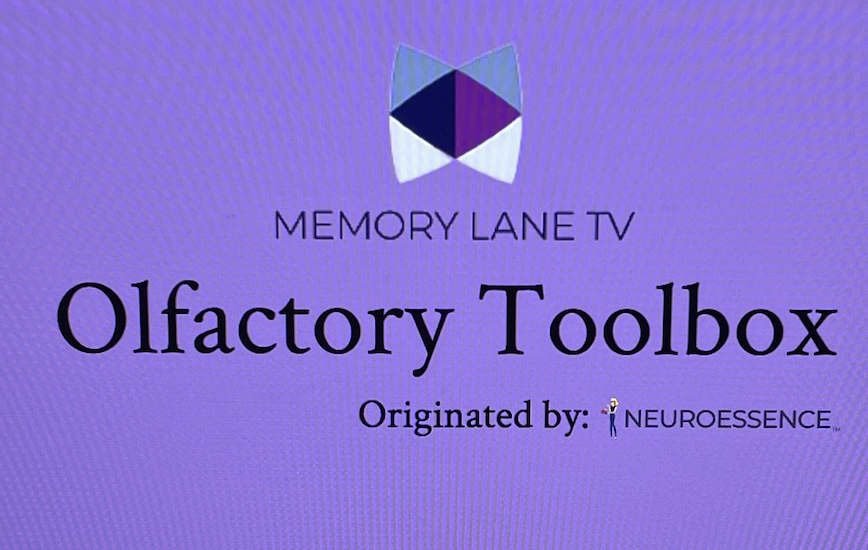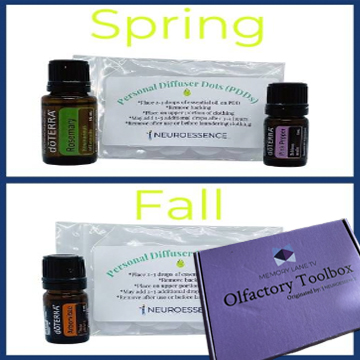Memory Lane & Olfactory Stimulation
Discover the power of olfactory stimulation when associated with Memory Lane TV.
When a person living with dementia experiences sensory stimulation, that information is processed in the limbic system of the brain, influencing their emotions in the amygdala and memories in the hippocampus. Therefore, when positive stimuli is used, it can influence the person to feel positive feelings and memories, ultimately affecting their behaviors. Aromatherapy provides support using olfactory stimulation. Inhalation of essential oils provides an entryway to the limbic system, promoting positive feelings and memories. When used, this can influence a sense of calm, boost in mood, etc., influencing productive behaviors.
What is Olfactory Stimulation?
Aromatherapy is a relatively safe, all-natural use of essential oils to support one’s health. Although research has shown that a person’s sense of smell may decrease as Alzheimer’s disease progresses, the nose is still an entryway for the sensory stimuli of essential oils because the nasal cavity and nerve cells in the nasal lining are the closest entry to the limbic system. This connection between the sense of smell and the limbic system accounts for the influence of essential oils on mood and memory.
Using essential oils can aid in efforts to restore the body back to its natural balance. For example, if you’re feeling sad, they may help you feel content; if you are feeling anxious, they may help you relax. Essential oils can be diffused in the air, placed on stoned jewelry, or applied to pulse points around the neck and wrist areas, like perfume or cologne. Within 20 seconds of inhaling, an essential oil will start to work. And by 30 minutes they have traveled throughout the whole body.
Many clinical trials support the effectiveness of essential oils, including lavender and cedar for reducing anxiety and peppermint for mental stimulation. Essential oils may also be used to stimulate the appetite, help with sleep, increase energy, improve attention and concentration, and much more.
The newest empirically-validated framework that includes the use of aromatherapy is the Dementia Connection Model©. Our catalog of films induces a variety of responses in the viewer, such as anxiety stress-reduction, re-grounding to combat sundowning, increased appetite, improved engagement, memory activation, as well as other positive benefits. These symptom management are enhanced when paired with aromatherapy.
The Memory Lane TV Olfactory Box

The Perfect Day fits nicely with pleasing auditory and visual sounds, like with Memory Lane TV. Based on scientific evidence.
Benefits of using Aromatherapy
Geriatric physicians, occupational therapists, long-term care institutions and memory care research centers were involved in the design of the intervention. Media stimulation has wonderful potential as an additional tool for dementia care. At the Benson-Henry Institute for Mind Body Medicine at Massachusetts General Hospital, Dr. Benson, the noted inventor of the relaxation response, described the effect of Memory Lane TV as a way to demonstrate the effectiveness of the relaxation response on a specific pathology that impact the brain, i.e., dementia.
After 8 years of gathering data about the efficacy of the intervention, Memory lane TV has identified three main benefits of sensory stimulation in long-term care or at home:
- It increases respite opportunity,
- It decreases stress and anxiety,
- It improves interaction with a person with whom care partners are caring for.
The Memory Lane TV Olfactory Box

All-in-all, olfactory stimulation should be included as part of any holistic plan of care or simply just daily use for those living with dementia. Start this by trying The Perfect Day, using aromatherapy, within the Dementia Connection Model; add The Perfect Day to Memory Lane TV for a multi-sensory experience.
Watch: A short film to understand how olfactory stimulation works and how we use it in the context of dementia
Olfactory stimulation or olfactory training can be a simple and convenient new intervention for alleviating and maintaining cognitive function and BPSD in older adults with dementia. The symptoms and severity of dementia should be considered during stimulation. Along with Dr Stelter and Jessica Ryan, we developed a very special collection of tools paired with films that help to manage dementia symptoms.